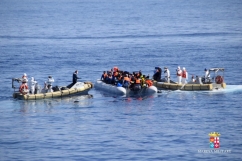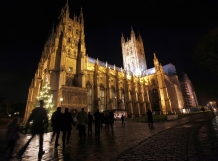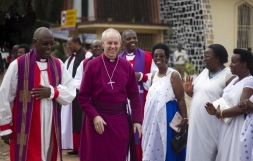When the first words on the morning news bulletin are, "The Archbishop of Canterbury," it's rarely a 'good news' story. Stories about division, strife and discord in the Church are the ones which dominate. The quiet good work of the Church rarely hits the headlines.
The Most Rev Justin Welby, leader of around 80 million Anglican Christians around the world, had been interviewed by a political magazine. During the conversation he'd been asked about the refugee crisis and the line of his reponse which prompted the headlines was about the response of some in the UK. "Fear is a valid emotion at a time of such colossal crisis," said the Archbishop.
Justin Welby is an astute politician, a consummate media performer and sensitive to the different constituencies he has to serve. Far more than that, he's prayerful and deeply serious about reconciliation. This isn't a man looking to stir up the perennial hornets' nest.
So let's look at what he actually said about British people being "anxious" about the crisis. "There is a tendency to say 'those people are racist', which is just outrageous, absolutely outrageous... Fear is a valid emotion at a time of such colossal crisis. This is one of the greatest movements of people in human history. Just enormous. And to be anxious about that is very reasonable."
The Archbishop went on, "In fragile communities particularly – and I've worked in many areas with very fragile communities over my time as a clergyman – there is a genuine fear: what happens about housing? What happens about jobs? What happens about access to health services? There is a genuine fear. And it is really important that that fear is listened to and addressed. There have to be resources put in place that address those fears."
This is not the rant of a dangerous demagogue, ripe for condemnation by right-on liberal commentators. It's a mature, sensible position reached by a lifetime of thoughtful engagement with communities in England and around the world.
Welby's nuanced take on the impact of the crisis here in the UK is based on a deep spiritual reflection. Like Pope Francis, he knows the biblical injunction for us to care for our neighbours doesn't just mean 'people who already live in our country' or 'people who look like us'. The Parable of the Good Samaritan tells us that it is our Christian duty to respond to the refugee crisis with an outpouring of love, compassion and practical help.
In the Middle East itself, from where so many of the refugees are fleeing, there are Christian groups and churches, large and small who are battling to alleviate the worst of the suffering. In Calais, there are dedicated volunteers who are tirelessly assisting desperate people kept in appalling conditions.
Christians are also at the heart of calls for the UK to take an increasing number of refugees. Citizens UK's campaign to ensure the government takes far more of its fair share of refugees has begun to see a shift from the government. Yet Welby has rightly criticised the slow reaction from the UK – saying, in reference to Germany's response, "I was in Berlin, and the churches there are doing the most extraordinary things, as are the German people... They took 1.1m last year. And it does make 20,000 [that the UK will take] over several years sound really very thin."
Having said all of this, Welby knows that in addition to the extraordinary compassion of the British Church, there is also fear. Though liberal commentators in London may not realise it, Welby's experience as a priest in tough assignments in Coventry, Liverpool and Durham mean he's altogether more streetwise. Church of England clergy are often the last line of defence for vulnerable people. With the way the welfare state is being cut and voluntary services struggling to meet demand, Welby has ready access to a network of thousands of churches who will be filling him in with stories of how the refugee crisis is being perceived, not from comfortable commentator's chairs like mine, but from the most deprived corners of post-industrial Britain.
The Archbishop realises some obvious truths.
First, that there is a difference between the refugee crisis and economic migration. It is perfectly possible to think (as the Archbishop appears to) that the UK is being far too miserly in responding to the refugee crisis, but to acknowledge that economic migration has been high over the last 15 years and that there are parts of the country where that has fundamentally changed the way of life.
Secondly, the Archbishop sees that there is a complete incompatibility between operating an open border policy to all, and maintaining the strong safety net of the welfare state that the British people have enjoyed for the last 70 years. The solidarity between people who pay into that system and receive its care will be fractured completely if borders are open to all. Again, this does not mean that refugees aren't welcome – quite the opposite – refugees are often incredibly hard working and contribute massively to their adopted home. But a completely open border endangers the social solidarity that we have built up over generations.
Thirdly, the Archbishop, having spent time in various conflict zones during his reconciliation work, will be wary of the simmering discontent associated with communities feeling like they're not being listened to. Yes we've seen off the fascists of the National Front, the BNP and the English Defence League. But for how much longer will we be able to maintain peace if the simmering resentment the Archbishop identifies is simply ignored?
Welby mentioned the specific fears he thinks British people have around the crisis. "What happens about housing? What happens about jobs? What happens about access to health services?" Here he hits the nail on the head.
There are communities across England and the rest of the UK which have been forgotten. As the country has been radically deindustrialized over the last 50 years, there are areas which have been decimated. It's the same in the USA of course. This incredibly thoughtful piece demonstrated how support for Donald Trump isn't just about racism; it's about a working class revolt against the neo-liberal capitalism which has left their communities for dead.
Sunder Katwala, a British commentator on race, immigration and integration, recently wrote, "Of course, it isn't racist to talk about immigration – as long you do so without being racist. That's the debate people want. Anti-racists would have much to gain from that, if they stopped shouting almost as shrilly as the populist xenophobes – which only closes down the conversation that Britain's moderate majority would like." Replace "immigration" with "The Refugee Crisis" and he's spot on. Welby instinctively gets this.
The Archbishop has spoken out about people's legitimate fears of the crisis. While this has cheered the little Englanders at the Daily Mail, Welby's position is far more nuanced. He has earned the right to talk about this fear, off the back of his tireless work advocating for refugees (and for a vast range of social justice issues).
Politicians would do well to follow his lead – and open up a proper conversation about how we can acknowledge the dislocation and disintegration felt in parts of the country. At the same time, Welby is already leading us in a compassionate conversation around how we can do far more to help the hundreds of thousands of desperate refugees fleeing from parts of the world we've so often interfered in. He's a leader. We should follow his example.

















